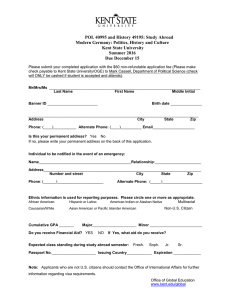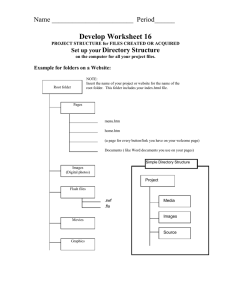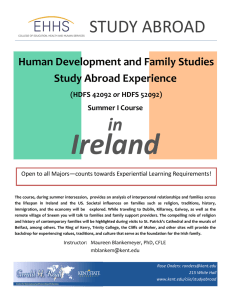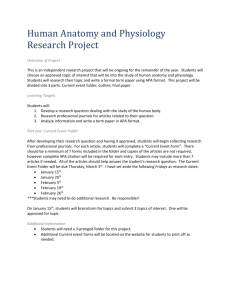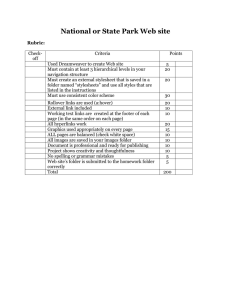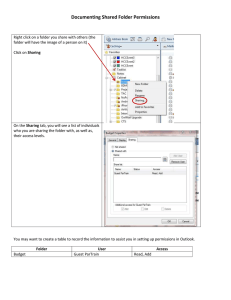International Students in the American College HIED 7/66672 - Fall 2010
advertisement
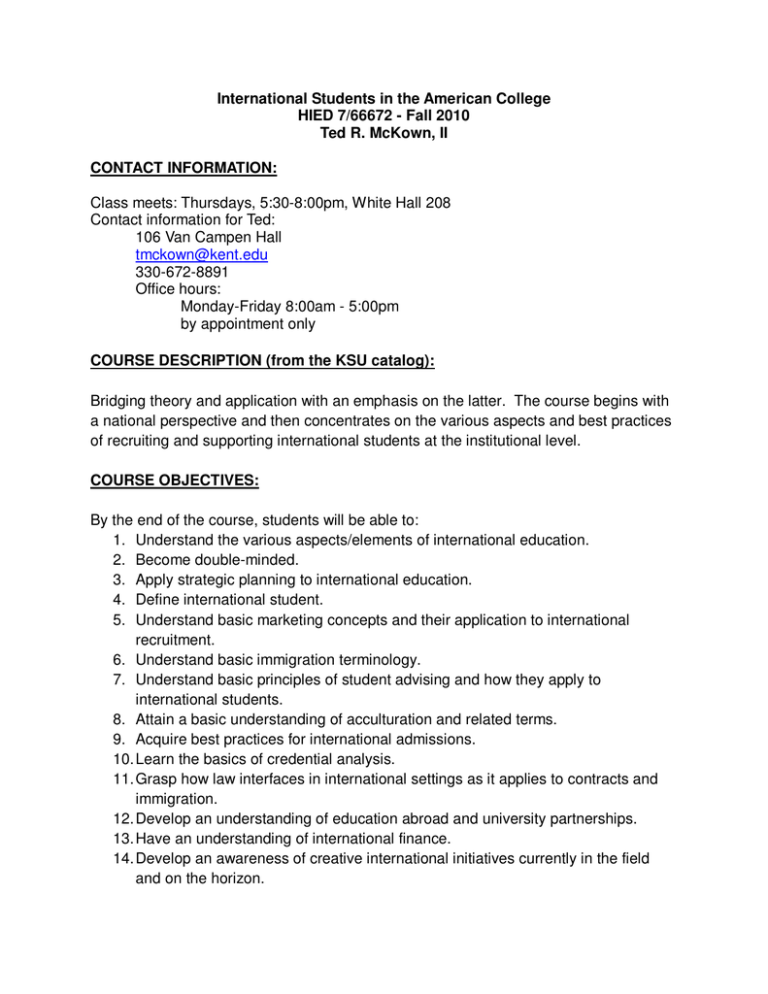
International Students in the American College HIED 7/66672 - Fall 2010 Ted R. McKown, II CONTACT INFORMATION: Class meets: Thursdays, 5:30-8:00pm, White Hall 208 Contact information for Ted: 106 Van Campen Hall tmckown@kent.edu 330-672-8891 Office hours: Monday-Friday 8:00am - 5:00pm by appointment only COURSE DESCRIPTION (from the KSU catalog): Bridging theory and application with an emphasis on the latter. The course begins with a national perspective and then concentrates on the various aspects and best practices of recruiting and supporting international students at the institutional level. COURSE OBJECTIVES: By the end of the course, students will be able to: 1. Understand the various aspects/elements of international education. 2. Become double-minded. 3. Apply strategic planning to international education. 4. Define international student. 5. Understand basic marketing concepts and their application to international recruitment. 6. Understand basic immigration terminology. 7. Understand basic principles of student advising and how they apply to international students. 8. Attain a basic understanding of acculturation and related terms. 9. Acquire best practices for international admissions. 10. Learn the basics of credential analysis. 11. Grasp how law interfaces in international settings as it applies to contracts and immigration. 12. Develop an understanding of education abroad and university partnerships. 13. Have an understanding of international finance. 14. Develop an awareness of creative international initiatives currently in the field and on the horizon. GENERAL INFORMATION: Academic Integrity: The HIED program Student Handbook provides you with information about and links to Kent State’s policies on academic honesty. Academic integrity, using the definitions common in Western academic institutions, is taken very seriously in this class. Failure to observe appropriate standards of academic integrity can mean failure in the class – and failure in your career. If you have any concerns about APA style and the kinds of citations that are needed, please visit KSU’s Writing Center. Accommodation: University policy 3342-3-18 requires that students with disabilities be provided reasonable accommodations to ensure their equal access to course content. If you have a documented disability and require accommodations, please contact the instructor at the beginning of the semester. Please note, you must first verify your eligibility for academic accommodation through Student Accessibility Services; this office can be reached at 330-672-3391 and is located on the ground floor of the DeWeese Center on the Kent campus. For more information about your rights and responsibilities, see: http://www.registrars.kent.edu/disability/Current/StudentHandbook/RightsReas.htm Electronics: Out of courtesy to classmates, please remember to turn off cell phones and other electronic devices prior to class. Laptops are welcome for note-taking and doing research related to class, but not for non-course-related work. Holidays: If you will be observing any religious holidays that fall on a class date, and will be unable to participate in class on those days, please let Ted know in advance. Statement of Inclusion: Kent State University, as an equal opportunity educational institution, encourages an atmosphere in which the diversity of its members is understood and appreciated, and an atmosphere that is free of discrimination and harassment based on identity categories. Thus, all members of the university are expected to join in creating a positive atmosphere in which individuals can learn and work, an environment that is sympathetic, respectful and supportive. (See “University Policy Register”) Technology: This course is supported by WebCT VISTA Writing Commons: Kent State has a Writing Commons designed to help you with all kinds of writing issues, from grammar to transition sentences to writing thesis statements. It’s located on the fourth floor of the library. If you can’t get there, you can e- mail your paper and ask for feedback on a couple of specific problems. The Writing Center will NOT edit your paper for you, but will work with you to help you improve your work. Check the website for details. Contact information: • (330)-672-1787 • E-mail: writing@kent.edu • www.writingcommons.kent.edu HIED and Class Policies Absences and extensions Because of the class Teaching and Learning Philosophy described below, in which we use everyone’s expertise and perspectives, everyone depends upon everyone being in class. I am aware that life happens, that it snows in Ohio, and that it is possible that upon occasion you may be forced to miss a class. Please contact me in advance if at all possible, and please also contact any of your classmates who may be affected by your absence (e.g. when you are doing a group presentation). You are responsible for finding out what happened in class! Please also contact me if for some unavoidable reason you wish to hand in an assignment late. Lateness will affect your grade, because it will affect you in your professional life. Extensions are not available for assignments involving feedback to peers; your classmates are depending on you. Citations The HIED Program, like most programs in the social sciences, uses APA style. (In the social sciences, the date something was published is important; for example, for an analysis of higher education trends in Europe, you would care whether the book was published before the Bologna Declaration was signed [1999], or after. In the humanities, where MLA style is generally used, the date of publication is not quite so important: an analysis of Mozart’s works, or Tolstoy’s, that’s fifty or even a hundred years old may still have valuable insights.) The new edition of the APA Publication Manual (6th ed.) came out in July 2009. It had many mistakes and has since been reissued. If you do not have a copy, I strongly suggest that you buy one. You will use it not only for classes, but also in your professional work. You can find information online (Purdue’s “OWL” – Online Writing Lab – is particularly well known), but having the original source is helpful. (The APA’s own website I find rather cumbersome for looking up information.) American Psychological Association. (2009) Publication Manual of the American Psychological Association (6th ed.) Washington, DC: APA You must cite the sources you have used; otherwise, you are a thief: you have stolen someone else’s work. The in-text citation must provide enough information for the reader to find the full reference in your Reference List. Your Reference List must provide enough information for the reader to find a copy of your source. If you cite an author’s general line of argument, put the author’s name and the publication date of the work in parentheses. If you cite a direct quotation, you must add the page number, or, if you are using electronic material that does not have page numbers, use paragraph numbers or other identifying marks. Sources for research You must use scholarly journals and other scholarly sources in this class. In general, you will want to use peer-reviewed material. Wikipedia is never an acceptable source, since anyone, with any degree of knowledge or lack of knowledge, can add material to an entry. (As of late August 2009, Wikipedia has announced that it will provide editorial oversight of some entries. This does not mean that the entries will be written by experts in the field. You still should never use Wikipedia in your research, for this class or any class in the HIED program.) CLASS CALENDAR: WEEK 1 – September 2, 2010 – Introduction and Overview • Introductions • Defining terms • The International Student Picture (including your perceptions) • Syllabus overview WEEK 2 – September 9, 2010 – International Education, Internationalization and Acculturation • International Education Overview • Internationalization • Acculturation • Read one article from Week 2 folder • Read Book Ch 1 The International Student Picture WEEK 3 – September 16, 2010 – International Student Recruitment • Marketing Concepts • Marketing Research • International Student Recruitment • Read Book Ch 4 Recruitment • Read one article from Week 3 folder WEEK 4 – September 23, 2010 – International Admissions/Credential Analysis • Educational System Overview • Credential Analysis 101 • Case Studies in Class • Read article Credential Analysis 101 from Week 4 folder WEEK 5 – September 30, 2010 – Intercultural Adjustment and Learning • Cultural Adjustment • Guest Speaker to discuss Intercultural Adjustment and Learning • Read Book Ch 8 Intercultural Adjustment and Learning • Read article Becoming Interculturally Competent by Bennett WEEK 6 – October 7, 2010 – International Student Advising • Immigration • Psychological Issues • Discussion about International Student Immigration • ACIREMA Walk Through • Conduct SEVIS Training • Read Book Ch 9 Immigration and Legal Issues • Read one article from Week 6 folder WEEK 7 – October 14 2010 – International Orientation and Student Programming • International Orientation ideas and concepts • International Student Programming ideas • Read Book Ch 5 Orientation • Read article on Orientation Programming • Read article Welcome to America by Lee from Week 7 folder WEEK 8 – October 21, 2010 – English Language and Academic Support • English Language Programs • Supporting International Students Academically • Read Book Ch 6 (English Language Programs and Academic Support) • Read article Academic Stress by Chapman from Week 8 folder • Read article International Students by Andrade from Week 8 folder WEEK 9 – October 28, 2010 – Internationalization • Guest Speaker to discuss Internationalization • Read Lecture Series (Andrew Winston Lewis) 7pm KSC KIVA WEEK 10 – November 4, 2010 – Social Support Services and Threats to Success • Social Support Options for International Students • Professional Services when in need of help • Read Book Ch 7 Social Support • Read one article from Week 10 folder WEEK 11 – November 11, 2010 – University Partnerships (including sponsored and exchange programs) Legal and Financial Issues • University Partnerships • Sponsored Programs • Exchange Programs • Keeping International Programs Legal • International Contracts • International Finance • Read Ch 2 of Cross-Border Partnerships from Week 11 folder • Read one other article from Week 11 folder WEEK 12 – November 18, 2010 – Education Abroad • Education Abroad purpose • Education Abroad Types • Education Abroad Administration • Read one article from Week 12 folder WEEK 13 – November 25, 2010 – No Class (Thanksgiving) WEEK 14 – December 2, 2010 – Final Presentations • Final Presentations WEEK 15 – December 9, 2010 – Final Presentations • Final Presentations Instructor reserves the right to change the syllabus contents and class schedule. REQUIRED TEXT: Andrade, Maureen S. & Evans, Norman W. (2009). International Students: Strengthening a Critical Resource. American Council on Education, Lanham, Maryland, Rowman & Littlefield Education. RECOMMENDED TEXTS: Bevis, Teresa Brawner & Lucas, Christopher J. (2007). International Students in American Colleges and Universities: A History. Palgrave MacMillan, New York, NY. Sakamoto, Robin & Chapman, David W. (2011). Cross-border Partnerships in Higher Education: Strategies and Issues. Routledge, New York, NY. ASSIGNMENTS: 1. Class Participation You are expected to attend each class session. If this is impossible, it is your responsibility to contact the instructor in advance and make any necessary arrangements for missed work and lost participation. 2. Critical Threat Reflection Choose a critical threat to an international student studying in an American college. Critical Threat topics include: university support services, psychosocio cultural issues, academic differences, language barriers, cultural adjustment, discrimination or immigration. Write a 3 pg (double-spaced) reflection on how one of these issues affects international students and is a potential threat to their success. Assignment is due November 11. 3. Credential Case Study Complete the Credential Case Study to be distributed 9/23/10. In class on the 23rd your will learn how to do the calculations. Assignment is due September 30. 4. Marketing Research Assignment Conduct a market analysis on a selected country utilizing 4 sources of information (Source Ideas will be provided in class). Based on your analysis construct a 10 page marketing plan that will clearly communicate how you will recruit international students to Kent State University. The marketing plan should include the following elements: Executive Summary; Goals and Objectives; Country Overview and Current Market Situation; Opportunity and Issue Analysis; Marketing Strategy including Action Plan; Activity Timeline; Budget and; ROI Conclusion. Assignment is due December 9. 5. Final Presentation The Board of Trustees heard through the grapevine that you have put together a creative marketing plan to increase the enrollment of international students and they want to hear your ideas. They have placed you on their agenda for the December 9 board meeting. You have 10 minutes at the meeting. Going over your time limit could completely turn the board off. 10 minute presentation and 2 minutes for questions. Final presentations will be the last two weeks of class. EVALUATION: Assignment Class Participation Critical Threat Reflection Credential Case Study Marketing Research Assignment Final Presentation GRADING SCALE: A B C 90-100 80-89 70-79 Percentage of Grade 10% 20% 10% 30% Due Date Weekly November 11 September 30 December 9 30% December 2 & 9 D F 60-69 Below 60 Late Work: It is expected that course papers/projects will be submitted on the date due. Any student with extenuating or emergency circumstances that prevent submission on the due date should discuss his/her situation individually with the instructor. Late submissions will result in grade reduction.

